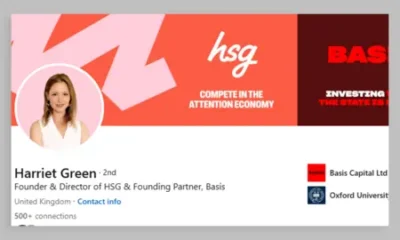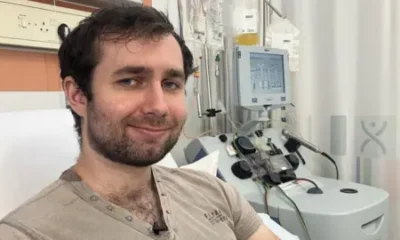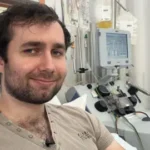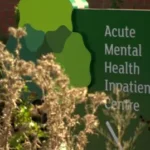Business
Life-saving stem cell centre welcomes first donors
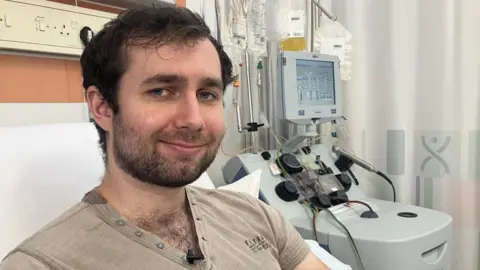
Read full article on post.
Rob Sissons, East Midlands health correspondent
The UK’s first stem cell collection centre strictly dedicated to transplants has started welcoming donors.
The Anthony Nolan Cell Collection Centre, based at Nottingham’s Queen’s Medical Centre (QMC), will help more people across the UK donate potentially life-saving cells to patients with blood cancers and disorders.
The Anthony Nolan charity said the centre would create 1,300 new donation slots a year, helping to tackle a “longstanding global shortage of cell collection facilities”.
Jordan, from London, said he was “proud” to be one of the first to donate. “I am really happy because today I could save someone’s life,” he added.
The centre will be run by the Anthony Nolan charity, in partnership with the National Institute for Health and Care Research (NIHR) Nottingham Clinical Research Facility.
Jordan was called by the charity to donate stem cells after analysis of a saliva sample he gave nine years ago, when he signed up to the stem cell register at a freshers’ fair at the University of Exeter, proved to be a good match to a stranger.
“It is such an easy thing to do to help someone else,” he said.
“I’m not the biggest fan of needles, but I’m happy to do anything if it helps another person.”
‘Special’ feeling
Anthony Nolan has more than 900,000 people on its own register of potential donors.
It said a “longstanding global shortage of cell collection facilities” meant some patients did not receive a transplant at the best time.
Growing demand for cell-based treatments has put donation facilities at some NHS and private hospitals under more pressure than ever, it added.
According to its own data, in 2022-23, only a fifth of donors on the UK registry were able to donate on the date requested by the patient’s medical team due to capacity issues.
Not having a transplant at the right time can have an irreversible impact on a patient’s mental and physical health, said Anthony Nolan, and sometimes leave them in a life-threatening condition.
The charity said the chance of being matched from its UK-wide register was one in 800, in the first five years of being on the register.
Jordan said it felt “special” to help a stranger, for whom a stem cell transplant might be their only hope of staying alive.
“I like to think if something were to happen to me, then someone would be willing to do the same,” he added.
What is a stem cell transplant?
A stem cell or bone marrow transplant is a life-saving treatment for thousands of patients with blood cancers and disorders. It replaces damaged blood cells with healthy ones.
Stem cells are special cells produced by bone marrow, a spongy tissue found in the centre of some bones, that can turn into different types of blood cells.
Donation is simple, Nicola Alderson – chief operating officer at Anthony Nolan – said.
“You are put on to a machine that has a needle in both arms,” she said. “The blood goes through the machine which takes out the stem cells and puts the rest of the blood back through.”
The process usually takes about five hours. Once the cells are collected from the bloodstream, they are typically transplanted into the recipient within 72 hours.
Anthony Nolan said any contact between a donor and patient depended on privacy regulations of the patient’s country, and was led by the patient.
UK rules allow direct contact from two years since the last transplant, although some overseas registries may not allow contact until five years post-donation.
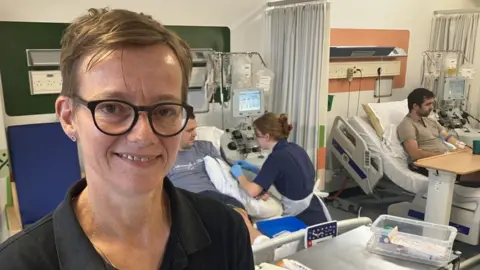
Anthony Nolan co-ordinates transplants for the NHS, collecting and delivering cells to hospitals across the UK and sending cells abroad. It is involved in more than 1,000 UK transplants between donors and unrelated recipients each year and sends cells abroad to another 300 patients.
Ms Alderson said prior to the new centre, the charity had struggled to get stem cells collected “at the time the clinical community need us to”.
“It is only one in five times where we have been able to get collections to donors on the day doctors have asked for them,” she added.
She said when recipients saw a bag of stem cells, “it is an incredible moment”.
“Ultimately, that small bag can save someone’s life. It is a bag of magic,” she added.
“We will make sure [donors] have the best experience at our new centre.”
The centre has been part-funded by Omaze, which partnered with Anthony Nolan and raised £3.7m through a house prize draw in June.
It is estimated the money will help fund the centre’s work for 18 months.
Kathryn Fairbrother, director of clinical operations for research and innovation at Nottingham University Hospitals (NUH) NHS Trust – which runs the QMC – added: “There are opportunities for Anthony Nolan and for ourselves to do research that we wouldn’t have done before.”
One of the research projects planned involves using stem cells to treat liver disease.
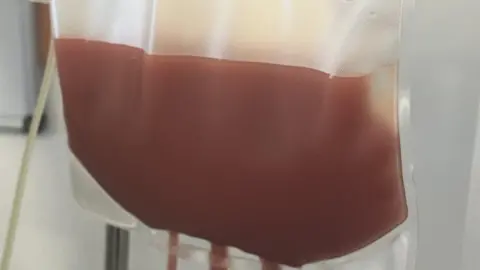
Stem cell transplant recipients, like Raj, will benefit from the new centre.
The 32-year-old, a University of Liverpool student, received a stem cell transplant in Leicester in 2020 after being diagnosed with a rare blood cancer called myelofibrosis.
His cells came from an anonymous donor in Germany.
“I sent him an anonymous thank you letter but I haven’t tried to get in direct contact yet. I’d like to,” Raj said.
“It took me about a year and a half to two years to recover. It took quite a long time, and I was off sick from work for about a year.”
Raj added: “The Nottingham development is a brilliant set-up.
“Being able to be more efficient collecting and delivering stem cells to patients who don’t have time to wait is fantastic.”
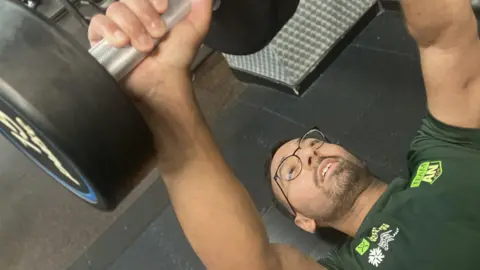
Raj would like to see more people sign up to become potential donors at Anthony Nolan.
They need to be aged 16 to 30 years old to register, and can stay on as a potential donor until the age of 61.
Potential donors send off a cheek swab sample and wait to see if they are a match for anyone.
“We need more. It is the ultimate act of kindness,” Raj added.
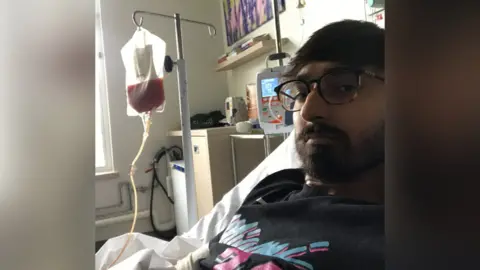 Supplied
SuppliedBusiness
Reform faces questions over tech investor’s role in cost-cutting drive
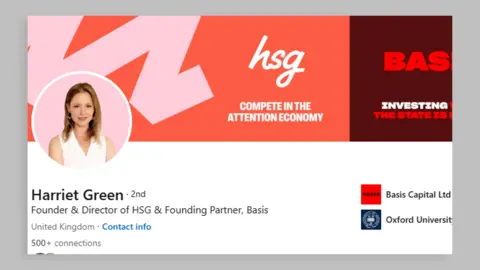
Read full article on post.
Joshua NevettPolitical reporter
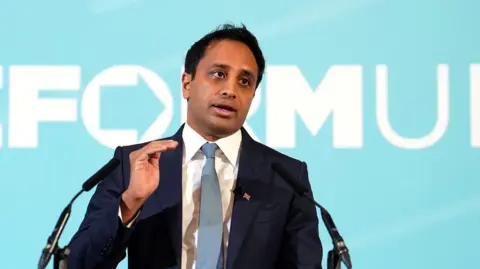 PA Media
PA MediaA tech start-up investor is taking a leading role in Reform UK’s efforts to access sensitive data in a bid to identify savings in one council controlled by the party, the BBC has learned.
Harriet Green, the founder of Basis Capital, is helping Reform UK’s Department of Government Efficiency (Doge) find ways to cut costs at West Northamptonshire Council.
She is an entrepreneur whose firm invests in businesses that provide services and work with, or compete against, local government.
Local councillors have raised concerns about whether it is appropriate for Green to access council data and questioned whether businesses backed by Basis would gain an unfair advantage over competitors.
Green declined to comment. Reform UK did not respond to requests for comment.
The BBC has been told Green is the only person Doge has put forward to access data at the council in Northamptonshire so far.
Senior council officers are vetting Green as they consider a proposal to allow her to analyse records of spending on items such as IT systems and hotels housing asylum seekers.
When Doge was launched after May’s local elections, Reform UK said a team of software engineers, data analysts and forensic auditors would “visit and analyse” spending at all of the councils controlled by the party to find “waste and inefficiencies”.
But the unit has been hampered by legal constraints and has not been able to access any council data so far.
Doge has only visited three of the councils controlled by Reform so far. It’s planning to visit a fourth, Lancashire County Council, in October.
Reform UK sources say they see the proposed data-sharing exercise and Green’s role in it in Northamptonshire as a potential model for gaining access to sensitive information at other councils.
Green’s company, Basis, launched last year and describes itself as an “early stage investor reimagining what governments can no longer deliver”.
Basis invests in companies such as Civic Marketplace, which is a public procurement platform designed to connect government agencies with service contractors.
In an interview with the Spectator this year, Green said Basis was a private fund set up to “invest in companies that are building where the state is failing”.
“A loftier way of putting that is we’re trying to outcompete the state,” said Green, a former intern at the Adam Smith Institute, a pro-free market think tank.
Councillor Daniel Lister, who leads Conservative opposition at the council, said Green’s role raised questions about potential conflict of interest given Basis’s stated mission and investments.
Lister said: “When a party unit opens the door to council data, it creates an inside track where firms built to outcompete the state will thrive.”
Jonathan Harris, the Liberal Democrat group leader, questioned what experience Green had in data handling and identifying savings at local authorities.
“There are questions not only about skill-sets but also about whether being involved in a Doge-type activity could provide some form of competitive advantage and access to information which others would not have,” Harris said.
“This would not be allowed under procurement rules for public bodies.”
The councillor said Doge and Green must be vetted by the council’s scrutiny committee if approval was granted.
Legal barriers
Doge is led by Zia Yusuf, Reform UK’s head of policy and its former chairman, and was inspired by billionaire Elon Musk’s efforts to cut government costs in the US.
It was set up in June this year after Reform UK took control of 10 local authorities in May’s local elections.
“Our team will use cutting-edge technology and deliver real value for voters,” Yusuf said.
But progress has stalled over data access and instead, Reform UK councillors are trying to find savings without Doge.
In Kent, a cabinet member for local government efficiency has been created, and the county council’s Reform leader has claimed potential savings worth millions have been identified.
Lancashire is finding it tougher, with the Reform UK county council leader there telling the BBC cutting costs won’t be easy.
Councils across England face significant financial pressures after years of tight funding.
Yusuf’s Doge has come closest to accessing data in West Northamptonshire, where in July the cabinet “approved a mechanism to review information sharing arrangements that could lead to potential future opportunities for identifying savings and efficiencies at the authority”.
In a report, the council said its executive leadership team had met “Reform UK visitors” twice to discuss “potential opportunities to share data with third parties for the purpose of identifying efficiencies and potential savings”.
The report said by law, local authorities must not “promote or publish any material to affect public support for a political party”.
“As the Doge offer is from and associated with Reform UK, a political party, this prohibition and the public law principles alongside it are of particular impact,” the report said.
The council said it understood members of Yusuf’s Doge team were “not employed by Reform UK” and had offered their services at no charge.
Council sources say they are still working through the vetting process.
In the meantime, the party insists the unit’s work is ongoing, pointing to deputy leader Richard Tice’s recent announcement about local government pension schemes.
Yusuf has frequently complained about “waste” in local government and the way in which contracts for services are procured, alleging a lack of competition and corruption.
In her interview with the Spectator, Green was asked whether the political appetite for US President Donald Trump and Doge filled her with confidence.
Green said: “I think there’s a UK-way of doing things that we haven’t felt out yet.
“I don’t think it needs to be brash or kooky or partisan. Those things give you a litmus for something maybe being timely and it’s a good opportunity.”
She added: “I’m not convinced that anyone in the public sector is incentivised in a way that gets good outcomes for the work that they’re doing.”
Business
Trump says he ‘will not allow’ Netanyahu to annex West Bank
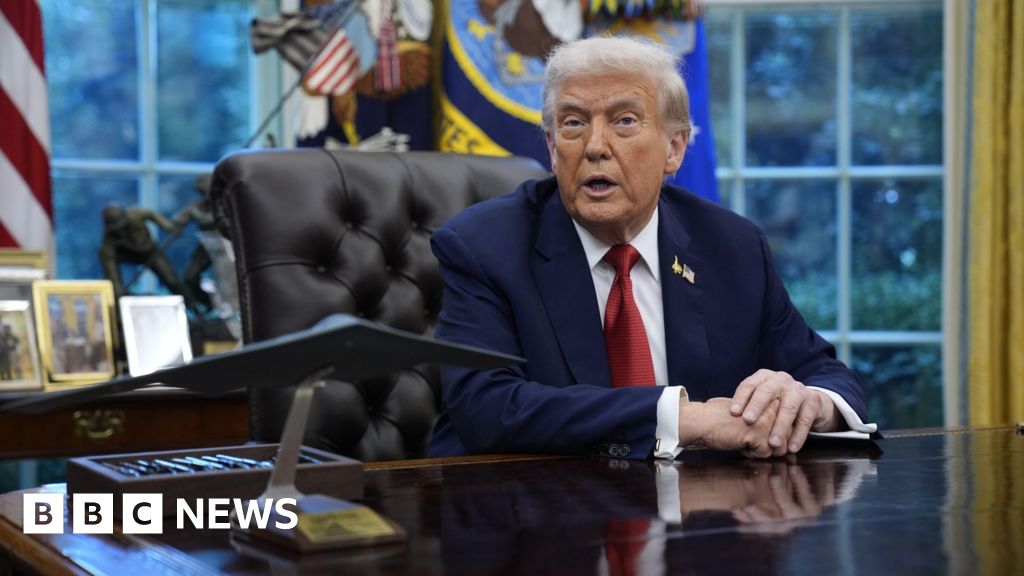
Read full article on post.
US President Donald Trump has said he will not allow Benjamin Netanyahu to annex the Israeli-occupied West Bank.
Speaking ahead of the Israeli prime minister’s address to the UN General Assembly on Friday, the US president told reporters in the Oval Office: “I will not allow Israel to annex the West Bank … It’s not going to happen.”
Trump, who will meet Netanyahu on Monday, also said a Gaza deal was “pretty close”.
Israel is facing increasing global pressure to end the war in Gaza and occupation of the West Bank as a wave of Western states formally recognise an independent Palestinian state. Far-right Israelis see annexation as a way to stop this prospect.
Ultranationalists in Netanyahu’s governing coalition have repeated calls for Israel to annex the West Bank, part of the Palestinian territories, outright.
The UK and Germany say they have warned Israel against annexation, while UN Secretary General António Guterres said at the UN on Monday it would be “morally, legally and politically intolerable”.
On Thursday, Trump told reporters in the Oval Office that he had spoken to Netanyahu as well as other Middle Eastern leaders.
“We’re getting pretty close to having a deal on Gaza, and maybe even peace,” Trump said.
Addressing the UN General Assembly via video link on Thursday, Palestinian President Mahmoud Abbas said he was ready to work with world leaders to implement a peace plan for Israel and the Palestinians announced by France on Monday.
Abbas, 89, was barred by the US from travelling to New York to appear in person.
He thanked those countries which had recently recognised a Palestinian state in a wave of declarations that started with Canada, Australia, the UK and Portugal on Sunday, followed by France, Belgium, Luxembourg, Malta, Monaco, San Marino, Andorra, and Denmark.
The US is currently opposed to recognising Palestine, saying such a move is a reward for Hamas.
“Hamas will not have a role to play in governance,” Abbas said in his speech. He also called for a Palestinian state to assume “full responsibilities” for the Gaza Strip following an Israeli withdrawal and connect it with the Israeli-occupied West Bank.
Trump met on Tuesday at the United Nations with the leaders of key Arab and Muslim nations who warned him of consequences if Israel moved ahead with annexation.
“I think the president of the US understands very well the risks and dangers of annexation in the West Bank,” Saudi Arabia’s Foreign Minister Prince Faisal bin Farhan told reporters.
On Wednesday morning Israel closed the only crossing between the Israeli-occupied West Bank and neighbouring Jordan, stopping more than two million Palestinians from accessing the outside world.
The closure came days after two Israeli military personnel were shot dead near the crossing by a Jordanian gunman, who was killed at the scene.
In Gaza, more than 80 Palestinians, including women and children, were killed by Israeli fire on Wednesday, most of them in Gaza City, local hospitals said.
The Israeli military launched a campaign in Gaza in response to the Hamas-led attack on southern Israel on 7 October 2023, in which about 1,200 people were killed and 251 others were taken hostage.
At least 65,419 people have been killed in Israeli attacks in Gaza since then, according to the territory’s Hama-run health ministry, including more than 18,000 children.
In August, the Integrated Food Security Phase Classification (IPC), a UN-backed body, said more than half a million people across Gaza were facing “catastrophic” conditions characterised by “starvation, destitution and death”. Netanyahu has repeatedly denied starvation is taking place in Gaza.
A United Nations commission of inquiry found Israel has committed genocide against Palestinians in Gaza, in a report Israel’s foreign ministry categorically rejected as “distorted and false”.
Israel is under increasing pressure to end the war and occupation.
In addition to more countries recognising a Palestinian state, the European Commission has unveiled plans to restrict trade with Israel and impose sanctions on extremist ministers in its government, which – if adopted – would be the EU’s toughest response to the war in Gaza.
This week Microsoft cut off some services to a unit of Israel’s Ministry of Defence after an investigation found its technology had been used to conduct mass surveillance on people in Gaza.
But Netanyahu has called for Israel to embrace increased self-sufficiency.
Breaking News
Life-saving stem cell centre welcomes first donors

Read more on post.
Rob Sissons, East Midlands health correspondent
The UK’s first stem cell collection centre strictly dedicated to transplants has started welcoming donors.
The Anthony Nolan Cell Collection Centre, based at Nottingham’s Queen’s Medical Centre (QMC), will help more people across the UK donate potentially life-saving cells to patients with blood cancers and disorders.
The Anthony Nolan charity said the centre would create 1,300 new donation slots a year, helping to tackle a “longstanding global shortage of cell collection facilities”.
Jordan, from London, said he was “proud” to be one of the first to donate. “I am really happy because today I could save someone’s life,” he added.
The centre will be run by the Anthony Nolan charity, in partnership with the National Institute for Health and Care Research (NIHR) Nottingham Clinical Research Facility.
Jordan was called by the charity to donate stem cells after analysis of a saliva sample he gave nine years ago, when he signed up to the stem cell register at a freshers’ fair at the University of Exeter, proved to be a good match to a stranger.
“It is such an easy thing to do to help someone else,” he said.
“I’m not the biggest fan of needles, but I’m happy to do anything if it helps another person.”
‘Special’ feeling
Anthony Nolan has more than 900,000 people on its own register of potential donors.
It said a “longstanding global shortage of cell collection facilities” meant some patients did not receive a transplant at the best time.
Growing demand for cell-based treatments has put donation facilities at some NHS and private hospitals under more pressure than ever, it added.
According to its own data, in 2022-23, only a fifth of donors on the UK registry were able to donate on the date requested by the patient’s medical team due to capacity issues.
Not having a transplant at the right time can have an irreversible impact on a patient’s mental and physical health, said Anthony Nolan, and sometimes leave them in a life-threatening condition.
The charity said the chance of being matched from its UK-wide register was one in 800, in the first five years of being on the register.
Jordan said it felt “special” to help a stranger, for whom a stem cell transplant might be their only hope of staying alive.
“I like to think if something were to happen to me, then someone would be willing to do the same,” he added.
What is a stem cell transplant?
A stem cell or bone marrow transplant is a life-saving treatment for thousands of patients with blood cancers and disorders. It replaces damaged blood cells with healthy ones.
Stem cells are special cells produced by bone marrow, a spongy tissue found in the centre of some bones, that can turn into different types of blood cells.
Donation is simple, Nicola Alderson – chief operating officer at Anthony Nolan – said.
“You are put on to a machine that has a needle in both arms,” she said. “The blood goes through the machine which takes out the stem cells and puts the rest of the blood back through.”
The process usually takes about five hours. Once the cells are collected from the bloodstream, they are typically transplanted into the recipient within 72 hours.
Anthony Nolan said any contact between a donor and patient depended on privacy regulations of the patient’s country, and was led by the patient.
UK rules allow direct contact from two years since the last transplant, although some overseas registries may not allow contact until five years post-donation.

Anthony Nolan co-ordinates transplants for the NHS, collecting and delivering cells to hospitals across the UK and sending cells abroad. It is involved in more than 1,000 UK transplants between donors and unrelated recipients each year and sends cells abroad to another 300 patients.
Ms Alderson said prior to the new centre, the charity had struggled to get stem cells collected “at the time the clinical community need us to”.
“It is only one in five times where we have been able to get collections to donors on the day doctors have asked for them,” she added.
She said when recipients saw a bag of stem cells, “it is an incredible moment”.
“Ultimately, that small bag can save someone’s life. It is a bag of magic,” she added.
“We will make sure [donors] have the best experience at our new centre.”
The centre has been part-funded by Omaze, which partnered with Anthony Nolan and raised £3.7m through a house prize draw in June.
It is estimated the money will help fund the centre’s work for 18 months.
Kathryn Fairbrother, director of clinical operations for research and innovation at Nottingham University Hospitals (NUH) NHS Trust – which runs the QMC – added: “There are opportunities for Anthony Nolan and for ourselves to do research that we wouldn’t have done before.”
One of the research projects planned involves using stem cells to treat liver disease.

Stem cell transplant recipients, like Raj, will benefit from the new centre.
The 32-year-old, a University of Liverpool student, received a stem cell transplant in Leicester in 2020 after being diagnosed with a rare blood cancer called myelofibrosis.
His cells came from an anonymous donor in Germany.
“I sent him an anonymous thank you letter but I haven’t tried to get in direct contact yet. I’d like to,” Raj said.
“It took me about a year and a half to two years to recover. It took quite a long time, and I was off sick from work for about a year.”
Raj added: “The Nottingham development is a brilliant set-up.
“Being able to be more efficient collecting and delivering stem cells to patients who don’t have time to wait is fantastic.”

Raj would like to see more people sign up to become potential donors at Anthony Nolan.
They need to be aged 16 to 30 years old to register, and can stay on as a potential donor until the age of 61.
Potential donors send off a cheek swab sample and wait to see if they are a match for anyone.
“We need more. It is the ultimate act of kindness,” Raj added.
 Supplied
Supplied-
Culture3 days ago
Taylor Swift’s new cinema outing generates more than €12million in just 24 hours
-
Politics3 days ago
European Parliament snubs Orbán with vote to shield Italian MEP from Hungarian arrest
-
Health3 days ago
EU renews support for WHO’s Universal Health Coverage Partnership
-
Culture2 weeks ago
Life, loss, fame & family – the IFI Documentary Festival in focus
-
Culture3 days ago
Twilight at 20: the many afterlives of Stephenie Meyer’s vampires
-
Environment6 days ago
Key oceans treaty crosses threshold to come into force
-
Culture2 months ago
Fatal, flashy and indecent – the movies of Adrian Lyne revisited
-
Culture1 week ago
Farewell, Sundance – how Robert Redford changed cinema forever



